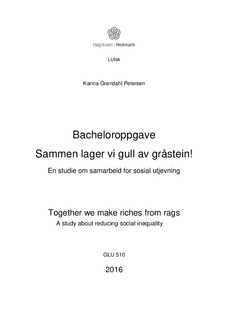| dc.contributor.author | Petersen, Karina Grøndahl | |
| dc.date.accessioned | 2018-04-24T12:08:54Z | |
| dc.date.available | 2018-04-24T12:08:54Z | |
| dc.date.issued | 2016 | |
| dc.identifier.uri | http://hdl.handle.net/11250/2495704 | |
| dc.description | Bacheloroppgave, grunnskolelærerutdanning, 2016. | nb_NO |
| dc.description.abstract | Norsk:
Til tross for at styringsdokumentene for norsk skole legger stor vekt på sosial utjevning, viser forskning at sosial reproduksjon allikevel finner sted i dagens samfunn. Denne studien trekker paralleller, og ser på sammenhenger mellom elevenes sosiale arv og deres prestasjoner i skolen, både faglig og sosialt. Forskningen viser at det er stor sammenheng mellom foreldrenes utdanningsnivå, deres sosioøkonomiske status og elevenes resultater, samt elevenes fremtidige yrkesvalg. Også når det gjelder frafall i skolen er foreldrenes utdanningsnivå avgjørende. Funnene i denne undersøkelsen viser at samarbeidet mellom skole og hjem i stor grad er lærerstyrt, og at det er preget av mye informasjon, og lite reel medbestemmelse fra foreldrene. Dette til tross for at forskningen viser at et tettere samarbeid og mer dialog vil vær hensiktsmessig for den sosiale utjevningen.
Bidraget til fagfeltet fra denne bacheloroppgaven, kan være en innsikt i noen av årsakene til at sosial reproduksjon fortsatt finner sted. Et av studiens kanskje viktigste funn, er at lærere kvier seg for å etterspørre viktig informasjon om foresattes skole- og utdanningsbakgrunn, til tross for at studien viser at denne kan ha stor betydning for elevenes utvikling. Dette vil kunne ha betydning for norsk skole i forhold til foreldresamarbeidet, dersom man kan bryte disse barrierene, og benytte denne kunnskapen som en ressurs. | nb_NO |
| dc.description.abstract | English:
Despite the governing documents for Norwegian schools all attaches great importance to reducing social inequalities, research shows that social reproduction still occurs in today's society. This study draws parallels between students' social heritage and their performance in school, both academically and socially. The research shows that there is great correlation between the parents levels of education, their socioeconomic status and pupils achievements, all of which affects their future career choices. Also, the dropout rate shows that the education level of parents are essential. The findings of this study show that home-school cooperation is mostly teacher-directed, and it is characterized by much information, and little reel participation from the parents. This despite the fact that research shows that a closer cooperation and more dialogue would be important for reducing social inequalities.
The contribution to the field, by this bachelor, may be an insight into some of the reasons why social reproduction still occurs. One of this study's most important findings is that teachers are reluctant to ask for essential information about parental educational background. This despite the fact that the study shows that this can be very important for students' development. This could be useful for the school system, in relation to home-school cooperation, if one can break these barriers, and use this information as a resource. | nb_NO |
| dc.language.iso | nob | nb_NO |
| dc.subject | GLU | nb_NO |
| dc.subject | foreldresamarbeid | nb_NO |
| dc.subject | sosial arv | nb_NO |
| dc.subject | sosial utjevning | nb_NO |
| dc.subject | ressurser | nb_NO |
| dc.title | Sammen lager vi gull av gråstein! En studie om samarbeid for sosial utjevning. | nb_NO |
| dc.title.alternative | Together we make riches from rags. A study about reducing social inequality. | nb_NO |
| dc.type | Bachelor thesis | nb_NO |
| dc.subject.nsi | VDP::Samfunnsvitenskap: 200 | nb_NO |
| dc.source.pagenumber | 35 | nb_NO |
